Entertainment,
Food and Drink |
| Television |  |
There are five terrestrial television channels in Britain. BBC 1 and BBC 2 are publicly funded (and so do not carry any advertising) whilst ITV, Channel 4 and Channel 5 are the commercial channels.
|
- The BBC has a world-wide reputation for quality. Out of the two channels, BBC 1 is the more mainstream entertainment channel, while BBC 2 tends to be slightly more intellectual with, for example, lots of current affairs.
- ITV is made up of a network of regional companies, and as its funds come from advertising it is a more commercial channel.
- Channel 4 is partially subsidised and tends to be the most offbeat channel with an 'arty' feel. It also has a growing reputation for producing low-budget, but excellent films.
- Channel 5 is the newest channel and has a young, laid back and fun feel to it.
- The UK also has cable and satellite TV available which give some access to foreign television stations. Many hotels, especially the larger ones, now have access to cable and satellite TV. But if you consider satellite TV a necessity, do check first.
| Radio |  |
There are numerous radio stations in the UK, so whatever your taste or interests, you should find a station that suits you.
The
BBC has 5 radio stations:
- Radio 1 plays pop music and is aimed at a young audience.
- Radio 2 plays lighter music and is aimed at a more mature audience.
- Radio 3 plays mainly classical music.
- Radio 4 has news, drama and current affairs.
- Radio 5 concentrates on sport and news.
The BBC also has the famous World Service with news and current affairs from around the world.
There are also numerous
independent radio stations, which play a variety of music. Some are local, others are networked and some are national. Classic FM, Virgin FM and Atlantic 252 are the most popular independent radio stations.
Frequencies can be found in most newspapers and TV and radio guides such as TV Times.
Pubs
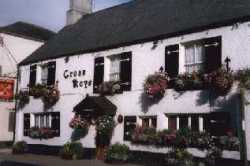 |
The pub (an abbreviation of 'public house') is still unrivalled in its position as the foremost British institution. They vary enormously - you can find lively bars with loud music, cosy oak-beamed pubs with open fires, no-nonsense bars that are the domain of working class men and tiny one-roomed bars that look as if they are someone's front room. Whatever your preference, there is probably a pub somewhere in the UK that would suit you. |
The Cross Keys. An olde worlde pub in Usk, Gwent
| |
Traditionally the pub was much more than just a place to go to drink alcohol. The local pub (or just 'local') would often form the heart of a community. It would be the place to go to play games and compete, where you would be able to catch up on news and pass on gossip, and where you would go to get support and sympathy in times of difficulty.
Today you can still find pubs like this, and each one will have a distinct atmosphere and its own regular patrons. In a small town, village or community it will be fairly easy to find this kind of traditional pub. But in larger cities you will have to look a bit harder as many of the pubs will be more modern and commercial.
|
Why do pubs all
have a sign outside? |
One of the oldest traditions when it comes to British pubs is the pub sign. This will be a pictorial or symbolic depiction of the pub name - a practice that originated in the past when few people could read. Pub signs were traditionally a great source of pride and were produced with great skill, and you will still see some today that are very elaborate and ornate.
|
Pub names are also often steeped in history. Many names are derived from heraldry, for example the Red Lion or the Golden Hart. Others are named after royalty for example the Prince Albert or the Crown.
Some names were derived from the setting for example a pub called The Plough would be in a rural setting. And others may reflect the long gone occupation of its patrons for example a pub called the Carpenters Arms will have once been the haunt of, you guessed it, carpenters.
Some names will be just plain weird, but an explanation will probably be there somewhere in history!
|
And what about those
strange names? |
Most pubs are now owned by a large brewery that will promote their own beer, sometimes with a few guest beers on offer to give some variety. Some pubs however will display the fact that they are a 'free house' which means that they are independent and can sell lots of different beers. As a result free houses often have a wider selection of beer often with some really obscure sounding beers from small, independent breweries.
|
Lounge Bar
or Public Bar? |
When entering a pub you will sometimes be given the choice between a 'public' bar and a 'lounge' bar. It is worth noting that the public one may well be a spit-and-sawdust affair (traditionally a male domain), whereas the lounge will normally a bit plusher and more suited to couples and groups of women.
|
Whichever side you choose, you will probably see people choosing to stand at the bar even though there are tables available - a practice known as 'propping up the bar'. Here the conversation is general and anyone can join in. The atmosphere is relaxed so no introductions are needed, making the pub a great place to meet local people. If you choose to sit at a table, you will gain a bit more privacy and the conversation will be just amongst your own group.
|
Propping up
the bar... |
Unlike the rest of Europe, the licensing hours in Britain are fairly restricted with pub opening hours being from 11am-11pm Monday to Saturday, and many pubs opening from 12noon-3pm and 7pm-10.30pm on Sundays. In larger towns and cities, you will usually be able to find a pub with late licensing hours, usually staying open until 1.00am.
|
| Last orders please... |
If you are in a pub and you hear a bell rung it means 'last orders'. This will be telling you to join the stampede of people rushing to the bar to order their last drink of the evening! After closing time you legally have 20 minutes to finish your drinks before leaving.
|
If you are lucky, you may find yourself in the middle of what is known as a 'lock-in'. This is where at 11.00, when legally the pub must stop selling beer, the barman will draw the curtains, lock the door and ask people to leave at their leisure from a discreet back entrance.
This is an old, traditional way to flout the drinking laws, and whilst it is in no way legal, the police do tend to turn a blind eye.
Lock-ins are more common in pubs that have a distinctly local feel, for example in rural areas.
Hotels often have a resident's license which doesn't require them to strictly adhere to normal licensing laws. The opening times of hotel bars can therefore vary.
|
Night-clubs
Every city and major town will have a range of nightclubs to entertain you, whilst some smaller towns will have just the one. Where there is a choice you will probably find that each club will have a distinct type of music, for example rock music, soul or jazz, and that as a result it will attract a distinct clientele.
So if there are a range of clubs to choose from, make sure that you pick the one best suited to your tastes.
Where there is only one nightclub available, you will probably find that it plays a wide range of music, with nothing too controversial. You may also find various theme nights adding to the variety.
Nightclubs tend to stay open longer than pubs, with extended licensing laws allowing them to serve alcohol for a few extra hours. Opening hours vary, but clubs will generally stay open until 2am, a bit later in London.
Dress codes also vary, with jeans being OK in some places, but not in others. Some clubs do not allow trainers (sports shoes), whilst others insist that men wear smart shirts. To avoid being refused admittance look for a club that is admitting people similarly dressed as you, or even better, check before you go.
|
|
Music
|  |
The UK has an excellent music scene, catering for all manner of tastes, from classical and opera to jazz, pop and club music.
Pop: When it comes to popular music, Britain has a long history of being at the forefront of the world scene, from The Beatles through to the present day. London's Kings Road was the home of punk in the 70s, while the 80s began with the New Romantics with bands like Duran Duran heading the charts.
And the late 80s saw bands such as the Stone Roses and Primal Scream as well as the rise of the rave scene. Today there is still an innovative, exciting range of British music out there for in the 90s Britpop bands such as Oasis, Blur have ensured that Britain is still a musical haven.
Dance: As well as live bands, the UK is a leader when it comes to dance music for the UK rave scene has spread to many other countries. You will find numerous DJs playing in clubs all over the UK and there is huge range of subcultures to be discovered such as house, jungle, trance and trip-hop.
Classical: If modern music isn't your scene, you should still find something to your taste. There are several excellent symphony orchestras in the UK and concerts are held regularly. The pinnacle of the classical music year is the annual 'Proms' held at the Albert Hall in London. This is a six week music extravaganza held each summer involving around a dozen orchestras and numerous other artists.
Choirs: There are also numerous choirs around the country who regularly hold performances.
Many are church choirs, but others are formed by all manor of people and institutions right down to burly working mens' choirs. Particularly renowned are Welsh male voice choirs.
Opera: Opera is another musical option. As an art form opera had been in decline in the UK but recent years have seen a revival. There are two English national opera companies, one in both Wales and in Scotland and several smaller ones dotted around the country.
Prices vary enormously so do not feel that a trip to the opera is out of your budget. Some performances however can be extortionate, but will probably be worth it as you'll feel like a very important guest at an exclusive party.
And the rest: Other music tastes such as jazz, blues and reggae are also well catered for in the UK, so you shouldn't have to travel too far to find a band you like.
In addition, throughout the year various towns hold music festivals for example Bath, Aldeburgh and Cheltenham. These generally have a central theme, different each year, but will also feature lots of other types of music.
|
Cinema
 |
You will find cinemas all over the UK where you can go and see the latest releases. Most films will be your Hollywood blockbuster variety, but there are also lots of cinemas which like to show more 'arty' films.
|
When it comes to filmmaking Britain does, in fact, have a legitimate claim to an excellent cinema tradition. There are numerous successful actors and actresses, such as Tim Roth and Emma Thompson who hail from the UK. And Britain has been the location for many, many films. But as with everybody else, in the past the UK has been overshadowed by the American giants.
Recent years, however, have seen a big improvement with several films produced by British companies, featuring British actors and British directors, and filmed in Britain achieving high acclaim and being very successful. Examples include Four Weddings and a Funeral, Trainspotting and Shallow Grave.
The main cinemas chains in the UK are MGM, Virgin, Odeon and ABC, but you will also find various other chains and numerous independent cinemas.
| Theatre |  |
There is no doubt about it, theatre is big in the UK. You can find replicas of theatres from Shakespeare's times, ones dating from the 19th Century and modern affairs, small theatres, massive theatres, and even open air, woodland theatres! As a result many visitors feel that a trip to Britain is not complete without an evening watching the stage.
The two main spots that visitors usually head for are London's world famous West End, and the home of Shakespeare Stratford upon Avon. But you will find theatres well worth a visit all over the UK, offering a wide range of shows from traditional 17th Century plays and 19th Century drama right up to contemporary performances.
It is also worth pointing out that as well as the obvious plays that will be shown, other types of performances can also be seen in theatres in the UK. For example comedy shows, ballets, operas and performances of contemporary dance can all regularly be seen in theatres up and down the country.
 |
When people think of theatre in the UK they naturally think of Shakespeare. If you are a fan, you will be spoilt for choice in the UK. And even if your previous experience of Shakespeare is confined to dreaded school lessons which have left you hating the word Shakespeare, give the stage version a try - you'll be surprised how much better it is! |
The Royal Shakespeare Company (RSC) regulalry tours the UK, and there will always be a Shakespeare's play showing at Stratford-upon-Avon.
There are three stages at Stratford, the Memorial Theatre, the Swan and The Other Place. Given the choice, go for the Swan as it specially constructed to replicate the theatres of Shakespeare's time. This makes it a wonderfully authentic experience and The Swan has a reputation as one of the most exciting venues in the country.
However, the big news in recent years has been the big news for fans of Shakespeare has been the rebuilding of the Globe Theatre in London, on the exact site where the original stood. The Globe Theatre was the first venue for many of Shakespeare's plays and so in terms of English Literature it is a very important place indeed. But it is not easy to see a play here.
The continued popularity of Shakespeare, along with the thrill of seeing hundred year old plays performed on almost the same stage has made the Globe exceptionally popular so tickets need to be booked well in advance. |
 |
Aside from the RSC, the Royal National Theatre, with its three stages on the South Bank in London, is also very popular. The three stages range in size from the Olivier which is massive to the much smaller Cottesloe. |
But aside from these obvious meccas, there are numerous other theatres around the country that are well worth visiting. For example, The National Theatre in London is always a good starting point, and the Haymarket in Leicester is well known for its musicals.
The Royal Exchange in Manchester is a futuristic building constructed within an 18th Century stock exchange. This mixture of old and new make it a fantastic setting and the theatre has become renowned as one of the most exciting in the country.
And when it comes to rural settings, you can't beat the Minack Theatre in Cornwall, which is situated on top of the cliffs overlooking the rugged coastline and the sea.
 | Ballet can often be seen at theatres throughout the UK. The Royal Ballet is the most famous and popular company, whilst the Birmingham Royal Ballet is also well worth watching. In addition to performing in their own theatres, these, along with the English National Ballet company, tour around the UK so even if you are in a smaller town you may be able to catch a performance. |
Food
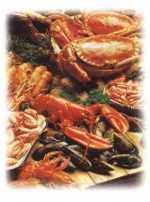 |
Unfortunately Britain doesn't have a very good reputation for food, but things have changed enormously in recent years. Now there is a host of award winning restaurants, which have raised the standards of British cuisine enormously.
The highest concentration of is naturally in London, but most of the larger towns and cities will boast an excellent restaurant where you can eat any number of delicious dishes. There is also a wide range of international cuisine available, from Indian and Chinese to French, Spanish and Latin American.
So nowadays you should be able to enjoy a delicious meal wherever you go. |
Every city and larger town will have the customary fast food joints like McDonald;s, Burger King and Pizza Hut. And you will also find the traditional 'greasy spoon' or 'caff' (cafe) - establishments that are pretty much a national institution! They will invariably look tacky and seedy from the outside, but the atmosphere inside is usually friendly and warm.
At a greasy spoon you will probably find meals such as huge but very reasonably priced English breakfasts, numerous dishes served with an enormous side order of chips and traditional British meals such as roast dinners.
Expect exquisitely served, original dishes of the finest ingredients and you'll probably be disappointed, but for cheap and cheerful you can't beat a greasy spoon.
You will also find the epitome of British cuisine, the Fish and Chip Shop or 'Chippy', wherever you go. Some have seating, but most are takeaways and so the sight of someone munching their fish and chips whilst walking down the street is commonplace. The quality of fish and chips can vary enormously, so if you are staying in particular area it might be worth asking a local to recommend a good one.
Pubs are also a traditional place to go for food. Pub meals used to have a dismal reputation, but in recent years the quality has improved enormously. Pub food can vary from inexpensive bar meals to expensive restaurant-style menus so whatever your budget you should find something to suit.
Traditional pub meals include dishes such as lasagne, steak and kidney pie and steak and chips. And at lunch time you can usually get very reasonably priced snacks such as soup and a roll, jacket potatoes or the traditional 'ploughman's lunch' of bread, cheese, salad and pickle. And on Sunday traditionally a full roast dinner of beef, chicken or pork is served (right). However nowadays you will probably find a much more extensive and increasingly innovative range of food is served.
The times when food is served vary from pub to pub. Traditional serving times are between 12noon-2pm and 7pm-9pm, although some do now serve food all day.
| 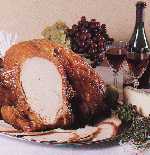 |
The diverse ethnic communities in Britain have also ensured that the variety of foods offered is enormous. Most towns will have at least a Chinese and Indian, and other Asian flavours such as Thai are becoming increasingly common. French and Italian restaurants are widespread, and Japanese sushi bars and Spanish 'tapas' bars are common in the larger cities.
Latin American restaurants are less common, but if you look you will find one.
A curry is often a very inexpensive way to enjoy a good meal, and a trip to an Indian Restaurant after an evening in the pub is a ritual that takes place at weekends throughout the country - an experience not to be missed!
Cornish Pasties, Cheddar Cheese,
Bath Cake and Cumberland sausages...
There are many varieties of regional specialities to be discovered all over the UK. Each place or area will invariably have its own delicacy which locals will claim tastes better there than anywhere else in the world. Some specialites, such as those above, you may have heard of, but others will be unknown and just waiting to be discovered.
Some areas will also be known for a certain type of food, usually related to the characteristics of the region. For example the highlands of Scotland are renowned for its game, whilst the coasts of Cornwall have made it famous for its seafood.
But wherever you go in the UK, you will find traditional favourites. Fish and chips, English breakfasts, bangers and mash (sausages and mashed potatoes), steak and kidney pie and toad in the hole (sausages in batter) are loved all over the country.
It is the full English breakfast that you are most likely to come across as this will be served in hotels, guest houses and bed and breakfasts wherever you stop. The basic ingredients are bacon and eggs and tomatoes with toast on the side. However, you might be offered a mammoth affair that also includes sausages, baked beans, mushrooms and fried bread!
Obviously not the healthiest breakfast, but it should be tried at least once during your stay. And don't worry, if you are watching your diet you should quite easily find healthier alternatives like cereals and fruit juices available.
|
|
Special Diets:
Vegetarians are very well catered for in the UK and the vast majority of menus will offer at least one vegetarian alternative.
Vegans will have a few more problems but the increasing number of Vegetarian restaurants that are springing up all over the country should cater for Vegans.
Kosher diets, however, are not particlarly well catered for in the UK. If you keep a strict kosher diet, try finding a nearby synagogue who may be able to advise you on where to find suitable restaurants. Only larger cities tend to have synagogues so you should also be prepared to accept that you may just have to prepare your own food.
|
|
Drink
|
| Tea is the nations favourite drink and phenomenal amounts are drunk every day - you only have to look at the enormous variety available to see just how popular it is. You will generally find that unless it is a herbal variety it is usually served strong and milky so say beforehand if you want it black. |  |
|
The common assumption is that the whole nation grinds to a halt at around 4pm each day as everyone indulges in the ritual of 'afternoon tea'. However for the vast majority of Brits a mug of tea grabbed on the run is the best that can be hoped for.
Nevertheless, 'afternoon tea' is still served in hotels and it should definitely be tried. It usually consists of dainty sandwiches with the crusts cut off, scones served with jam and clotted cream, and various pastries, all washed down with a pot of tea.
For coffee lovers the UK has often been regarded as a wasteland. But it is now becoming more and more popular with continental style cafes increasingly common where you can buy a cappuccino or espresso. More and more pubs are also serving filter coffee now, but if you order one in the evenings expect some strange looks. |
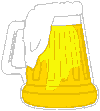 |
When it comes to alcoholic beverages, the Brits have long been given a hard time for serving their beer warm, but what the rest of the world calls beer is actually called lager in the UK. You should find at least one brand of lager available in every bar and you will be relived to know that it is, in fact, served cold.
|
|
But you will find drinks that are served warm - for the wide variety of British beverages on offer are traditionally served at room temperature. Recent years have seen a huge revival in the popularity of these traditional beers and you will find wide choice so something should suit your taste.
The biggest problem is deciding whether to try a bitter, an ale or a stout so here is a quick guide:
- Lager is the most popular beer in the UK. Strengths vary from 3-4% to over 5% for 'export' varieties.
- Bitter is traditionally the most popular beer and it is a dark coloured, uncarbonated drink, named for its sharp aftertaste.
- Ales are very similar to bitter and both are served at room temperature. There is a vast array of bitters and ales available, and beer lovers can spend hours discussing the virtues of their favourite bitter. If you are near a pub holding a beer festival pop in to try some more unusual varieties - it isn't unknown for over 50 different beers to be available.
- Stout is very dark (almost black) drink with a rich and creamy texture. Guinness is the most famous brand and Guinness lovers will swear it tastes better in Ireland.
- Cider is a light, fizzy drink made from fermented apples and is most common in the south west of England. 'Scrumpy' is cider's much more potent older brother - approach with care!
As a quick, fool proof way of selecting a good, quality beer, look out for a CAMRA sign. This stands for the Campaign for Real Ale and should indicate that the beer served is good.
If you seriously pursue a survey of British beers, you might find that a beer you like in one pub tastes different in the next. This is because serving traditional British beers is a fine art. Everything from the temperature the beer is stored at, to the pipes and the pumps can affect the taste of the beer and experts say they can spot a badly poured pint with the first taste.
Lager, bitter, ales, stouts and cider will be available in two measures - pints and half-pints. If you ask for a beer you'll get the full pint. And be warned, the strength of beer and cider in Britain can vary greatly, from the very weak to over 8%, so do check the potency before you order. |
| You'll also usually find a wide array of sprits and liqueurs available in pubs, often called 'shorts'. Spirit drinkers take note - whisky (minus an e) is Scotch, whiskey (with an e) is Irish or Canadian. Measures are quite small and reasonably pricey so drinking spirits in pubs is an expensive way to spend the evening, but very enjoyable if you have enough money. |
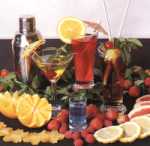 |
Wines are also widely available and are increasingly popular. You will find lots of excellent wine bars that offer a huge variety, but in pubs the choice is often more limited and of varying quality. It is also worth noting that wine is very expensive if purchased in a pub or restaurant, it is much, much cheaper if purchased in a supermarket or off-licence.
|
A word of advice on pub etiquette - in Britain it is customary for drinks to be bought in 'rounds'. This is where each person takes a turn in buying everyone in the group they are with a drink. If someone offers to include you in their round it is bad manners to offer them some money. But it is even worse manners to neglect to buy your round.
|
| If you are in the UK during the summer months, you might want to try a drink called Pimms, developed in the 1840s by James Pimm. This is a very English drink and it conjures up images of green grass, sunshine and strawberries. Typically a small measure of Pimms is served in a tall glass with lots of ice, a slice of lemon or lime, some cucumber and a sprig of mint and topped up with lemonade or soda water. The ultimate in refreshment on a hot day. |
|
|
|
Tipping
There are no hard and fast rules about tipping in the UK, however if you have received good service in a restaurant or café you should probably think about leaving a tip of 10-15% of the bill. It is legal, but not particularly common, for restaurants to include a service charge of 10-15%, but this should be clearly advertised.
And be careful - some restaurants have been known to add a service charge to a credit card bill and then also leave a blank for you to fill in for a tip. This is a scam - you should only pay a gratuity once. Fortunately though, it isn't a common one so you should find that most restaurants are very honest.
|
|
| Cigarettes |
 |
Whilst smoking is still common in the UK, attitudes have changed in recent years. Smoking is now prohibited on many forms of public transport and most public buildings, or at the very least it is severely restricted.
Restaurants and Hotels are mixed with some being strictly non-smoking, and others with distinct smoking and non-smoking areas - in which case you will probably be asked which you'd prefer when booking. Pubs however still tend to be very smoky environments. Some have non-smoking areas but adamant non-smokers will probably still find the atmosphere not to their taste.
For smokers though, the biggest consideration when visiting the UK is the price of cigarettes. The tax levied on tobacco is extremely high with a packet of 20 cigarettes usually costing over £3.
As a result, many visitors who smoke find that the best way to overcome this cost is to stock up on cigarettes before entering the UK.
There are customs restrictions on the amount of tax free cigarettes you can bring into the UK, so if you are entering Britain from an European Union country buy your cigarettes there.
In the UK it is against the law to smoke if you are under 16 years of age or to purchase tobacco products for children under 16.
|
|
 |
Drugs are strictly against the law, and any dubious looking visitors from notorious areas are likely to be searched when entering the UK. Whilst in the UK it is best to just stick clear of drugs. Being caught in possession of a small amount of cannabis will most likely result in fine, but larger quantities or 'harder' drugs could result in deportation or imprisonment. |
When it comes to alcohol, the legal age to drink or purchase beverages is 18. Children under the age of 14 aren't allowed in pubs or bars except in designated 'family rooms'.
However, there are some exceptions to this. For example, if an accompanied child over the age of 16 is seated in a licensed restaurant they can sometimes be allowed limited quantities of alcohol with their meal. The law is very complicated in this area, so it is probably best to check with the proprietor of a restaurant or hotel to see what they allow. |
 |
Drink driving is a big no-no, with strict limits and hefty penalties so it is best to not drink anything at all if you are driving.
|
|
Copyright © 1995 to 2016 Smooth Hound Systems
Smooth Hound Systems accepts no liability with regards to the accuracy of the information on this site.
Users are advised to double check information such as dates, times, prices etc.
















